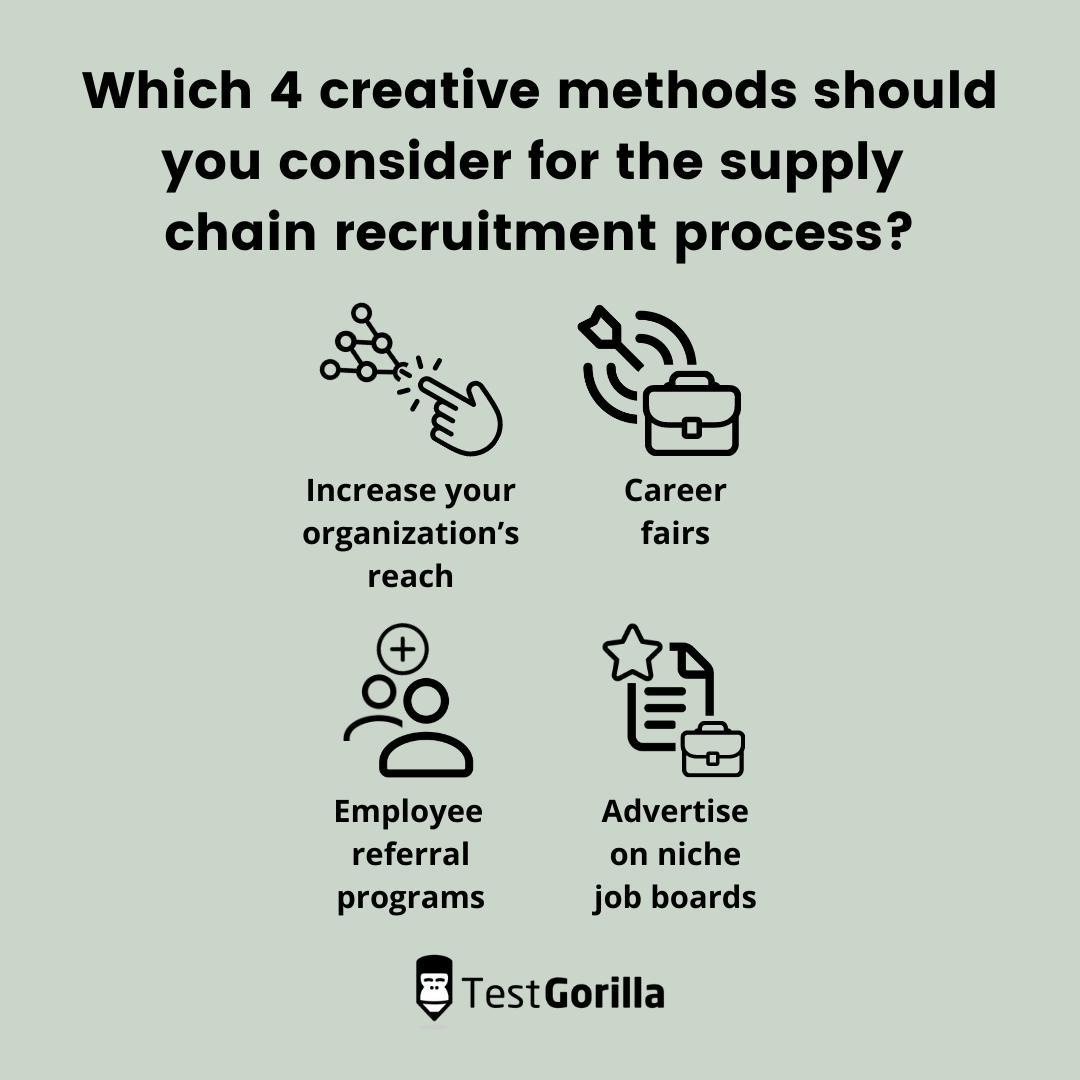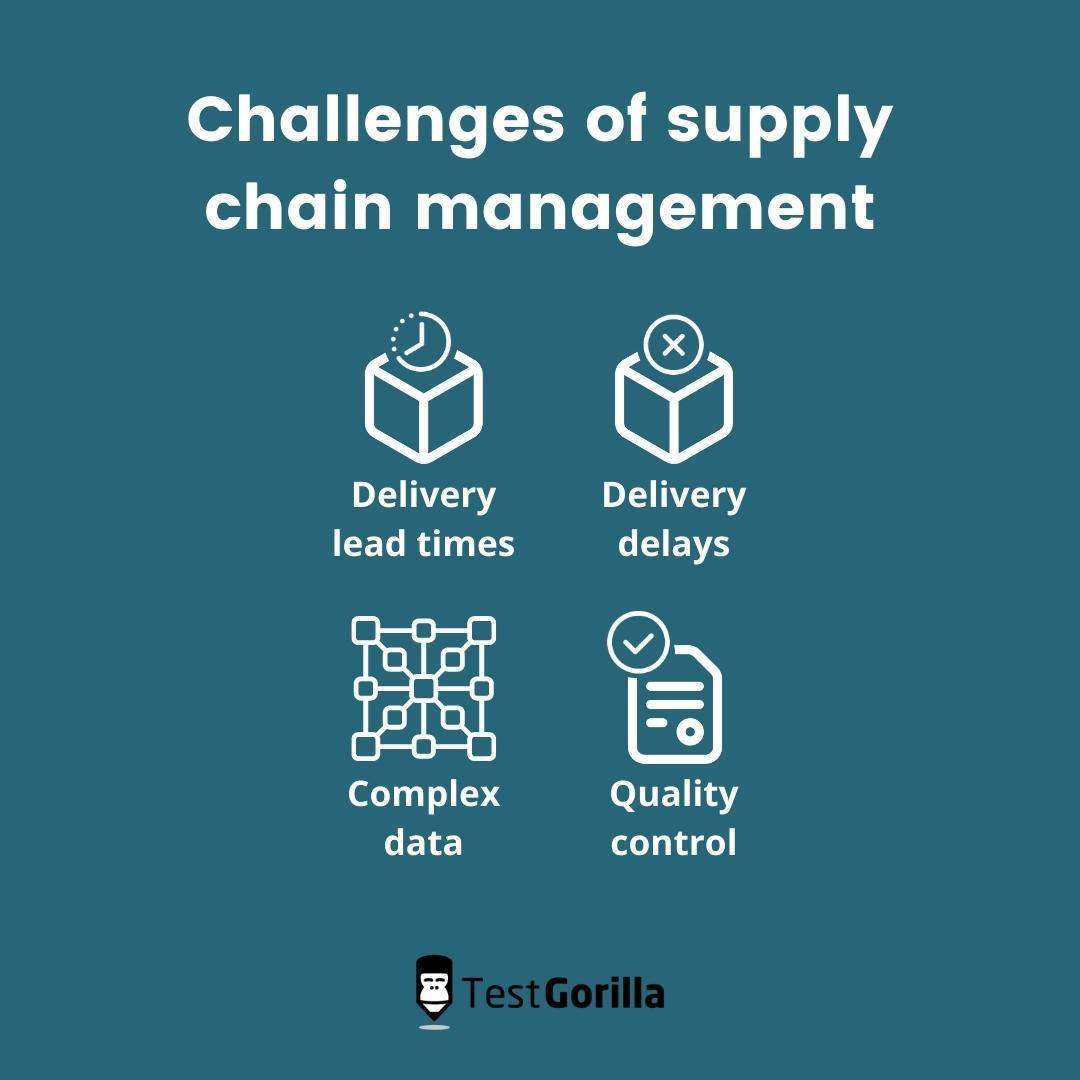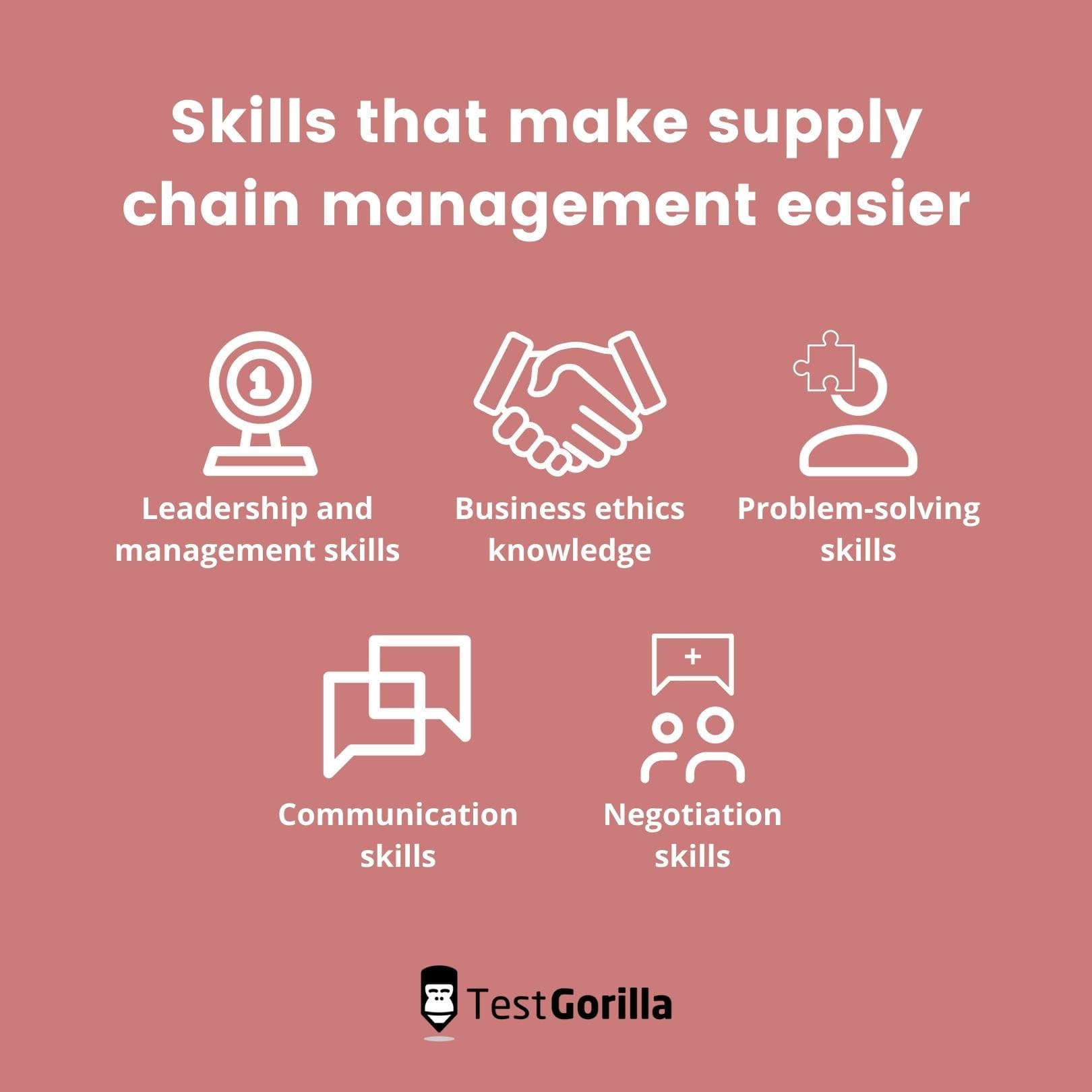Your ultimate guide to supply chain recruitment for your business
Unlike the supply chain industry itself, supply chain recruitment doesn’t always run like a well-oiled machine. It’s not simple to find the best people for your open role, and you need to follow several steps to hire top supply chain talent for your business.
Your next hire’s duties will often be challenging and complex, from supplying materials to making and selling commercial goods. These requirements and responsibilities require a skilled professional, so recruiting one for your company is essential.
In this ultimate guide, you’ll learn everything you need to know about supply chain recruitment for your organization.
Do you want to know the secrets to recruiting and testing supply chain professionals? Check out this article to learn more.
Table of contents
- What is supply chain recruitment, and why is it important?
- Why are supply chain managers important for companies that work with suppliers?
- What are the main difficulties of supply chain recruitment?
- Which 4 creative methods should you consider for the supply chain recruitment process?
- Which 5 labor supply chain stages should your candidates have experience with?
- What are the main challenges of supply chain management?
- How to write a supply chain job description for recruitment
- Which perks should you consider offering as part of your supply chain recruitment process?
- Where can you source exceptional supply chain management talent for your business?
- Is supply chain management difficult, and which skills make the role easier?
- What are the best ways to review your supply chain talent’s skills?
- How much do supply chain staff earn, and what salary should you offer new talent?
- Complete the supply chain management recruitment process with our top tips and skills tests
What is supply chain recruitment, and why is it important?
Supply chain recruitment involves recruiting for logistics companies and finding talent with excellent skills and knowledge of the sector. This process helps you improve your company’s ability to provide exceptional service for customers and clients.
Successful supply chain recruitment can enhance your organization’s profitability. With the right team members and supply chain skills, you can work toward long-term accomplishments and implement strategies to increase business revenue and reduce logistics costs.
Why are supply chain managers important for companies that work with suppliers?
Supply chain managers frequently work with suppliers and transport coordinators to improve the flow of goods by spotting any challenges or potential interruptions in the supply chain.
The best insights on HR and recruitment, delivered to your inbox.
Biweekly updates. No spam. Unsubscribe any time.
What are the main difficulties of supply chain recruitment?
Finding top talent with the right digital and soft skills can be difficult. Let’s consider these challenges in more detail.
Why are digital skills essential yet hard to find in supply chain recruitment?
From automation to cloud computing to machine learning, digital technologies are revolutionizing the supply chain industry. Digital tech can cut costs and save time; you’re missing a crucial opportunity if your talent lacks the digital skills to capitalize on these benefits.
With this digital revolution in mind, you must look for talent with digital skills that can accommodate the digital transformation of your supply chain business.
Digital skills aren’t easy to find in supply chain recruitment. It’s challenging to keep up with the digital evolution in supply management, and many professionals are not sufficiently equipped for it. But evaluating candidates’ abilities with skills assessments and interview questions is a good way to get started.
Why are soft skills so important yet difficult to find in logistics recruitment?
Soft skills will enable your new hire to secure supplies and maintain your supply chain company’s production. Communicating, negotiating, and using analytical and problem-solving skills are just some of the abilities your new hire will use to secure supplies.
Since soft skills are less tangible and harder to quantify than hard skills, you may find it difficult to review and assess them. Even though soft skills are vital in supply chain management, candidates may find it challenging to learn them, making it difficult to find skilled applicants.
However, skills testing and reference checking can help, so integrate skills assessments after you source candidates, and ensure you verify your applicants’ references.
Why is it difficult to find top talent in the supply chain industry?
With the shortage of talent in the supply chain industry, recruitment in logistics is becoming increasingly difficult. The demand-to-supply ratio for jobs to qualified talent is six to one in the supply chain world.
For this reason, finding top talent in the supply chain industry is challenging, and chief executives’ hiring decisions are lagging behind the industry’s explosive growth.
Sourcing candidates through the right channels can help you find skilled talent. Continue reading to find out where to find supply chain experts for your business.
Which 4 creative methods should you consider for the supply chain recruitment process?
Despite these challenges, there are four creative methods you can use to simplify the supply chain recruitment process for your company:
1. Increase your organization’s reach and share your relatable company message
The first method is to extend your reach and attract talent by sharing a relatable company message.
This involves sharing your organization’s values and describing its unique aspects (as well as those of your vacancy). You can distribute your company message efficiently by ensuring consistency across all channels.
For example, makes sure your brochures describe the same company message as your website and social media channels to attract applicants to your business.
Also, if your organization offers a range of exciting positions or career progression and networking opportunities, indicate this across all channels.
2. Participate in career fairs
You can also take part in career fairs at university campuses. If you use this strategy, ensure you exhibit the exciting aspects of your supply chain company. This can help you extend your organization’s reach within student communities
Avoid showing reports or heavily promotional documents at career fairs. Instead, share your website to get the student community intrigued and interested.
3. Use employee referral programs
The referral program recruitment method works by encouraging your current employees to refer top talent to you to consider for open roles.
If you choose this method, remember that offering rewards for successful referrals can be a strong motivator for your current employees to take part in the program. For example, offering them prizes or gifts is a great way to get them involved.
4. Advertise your supply chain job description on niche job boards
Your target applicants will have no problem discovering your business on niche job boards compared with traditional ones.
On traditional job boards, it’s all too easy for your listing to get buried among those of several hundred other organizations. That’s why we recommend niche job boards for supply chain job descriptions.
You’ll get the most out of your job descriptions if you post them on the right niche job board.
This method ensures you save the money you would have spent on posting your supply chain job description on traditional job boards. It will also enable you to show your ad in a space where it will be seen by your target candidates.
Which 5 labor supply chain stages should your candidates have experience with?
Your talent must be familiar with the five labor supply chain stages to be considered expert supply chain staff.
Consider the following list of indispensable skills when hiring a skilled professional to ensure you don’t miss any essential recruitment criteria:
1. Experience in planning
Can your applicants show their logistical planning experience, and do they know that planning is fundamental for controlling manufacturing and inventory processes?
Candidates should also know that matching the aggregate demand of clients with the supply of goods is critical to your organization’s success.
2. Expertise in sourcing
Do your applicants know that sourcing involves finding vendors to receive procured goods? Candidates should know that vendors must efficiently and economically meet planned demands and why lead time is crucial for perishable and non-perishable products.
3. Proficiency in producing goods
Transforming raw materials into quality products is the essence of producing goods in the supply chain industry.
Do your candidates know that certain activities are essential for the production stage, including assembling the products, testing their quality, and packing them? Can they prove their experience and proficiency in this area?
4. Delivery skills
Your applicants should be able to meet consumers’ expectations with your organization’s logistics services. Seamless deliveries can improve customer satisfaction, whether they are by rail, air, or road. Do your candidates understand how a successful delivery can enhance your company’s brand?
5. Knowledge of handling returns (reverse logistics)
Reverse logistics is an essential skill that can mitigate the decline of customer-business relationships and significantly impact your organization’s reputation.
Can your applicants properly handle returned products? Test their reverse logistics knowledge to determine whether they will prioritize your company’s reputation if hired.
What are the main challenges of supply chain management?
Your new hire will also face various challenges in a supply chain management role.
From understanding lead times to handling delays, managing data, and conducting quality control, here’s more information on the main challenges of supply chain management in logistics:
1. Lead times for delivery
The balance between supply and demand of products and services lies at the heart of lead times for delivery. Applicants should understand that long lead times can upset this delicate balance.
When hiring candidates, ensure your applicants have this knowledge. Review their lead time experience with a supply chain skills test.
2. Delivery delays
With long lead times come longer delays. The supply chain process consists of numerous steps (especially if your company ships globally), and long lead times and delivery delays become more likely at each successive stage.
To handle these delays, candidates must understand completion dates and shipping times. Assess your applicants’ knowledge in this area before hiring by using supply chain interview questions.
3. Complex data
Data management can be a complex issue in the supply chain industry. Candidates must understand how to manage complex data efficiently.
Have your applicants used efficient data management options in their careers? Do they understand that technologies like machine learning and data management tools can facilitate complex data-related tasks?
4. Quality control
Remember that quality control is an essential responsibility of supply chain managers. Verifying the quality of products is critical, as is clearly specifying the acceptable level of quality. Do your applicants know the importance of setting percentages that reflect the acceptable number of defects for products?
How to write a supply chain job description for recruitment
You now have a few criteria to consider during the supply chain recruitment process. Your next step is to draft and write a job description using these criteria to attract talent to your organization.
Here, we’ve provided a sample supply chain job description to help you. You can examine this sample and base your own model on it.
Sample supply chain job description
Our business is searching for a skilled supply chain staff member to join our team and ensure the seamless functioning of our logistics and supply chain operations.
Supply chain staff job brief
In addition to collaborating with other departments (such as finance teams and the operations department), you will make efficient plans for our business and logistics department. You will draw upon your teamwork, project management, and communication skills to plan logistics.
We’re particularly interested in meeting candidates with analytical and strategic skills and logistical expertise.
Supply chain staff responsibilities
Our next supply chain staff member will be responsible for the following duties:
Producing supply chain safety guidelines (such as for using forklifts)
Liaising with vendors to make cost-effective deals
Solving potential delivery problems
Creating a supply chain strategy for our organization
Analyzing shipping data to mitigate logistic blocks
Assessing key performance indicators
Monitoring inventories for our company
Supply chain staff qualifications and experience
We’re looking for a supply chain staff member with a supply chain or logistics degree and experience using SAP MM software tools to complete logistics tasks. You must have previous supply chain or logistics-related experience.
Supply chain staff skills
We are seeking applicants with the following skills:
Problem-solving skills
Excellent communication skills (including active listening)
Attention to detail
Organizational skills
Project management skills
Analytical skills
Which perks should you consider offering as part of your supply chain recruitment process?
Candidates look forward to a range of perks when applying for a supply chain staff role.
Here are some of the perks you should consider offering and emphasizing during recruitment:
1. The opportunity to enter a supply chain career without an advanced degree
Let candidates’ experience do the talking instead of requiring an advanced degree. Although certain roles do require a bachelor’s degree, it is possible to enter the supply chain field without advanced education.
Don’t forget to inform your candidates that you’re willing to consider their experience and not just their academic credentials. This will make your company stand out to applicants who don’t have a degree but may have a lot of experience and proficiency.
2. Career advancement opportunities
Remember to inform your candidates about any exciting opportunities for career advancement within your company.
Candidates may be keen to eventually become members of your company’s upper management and gain additional experience. So try to sell these opportunities and show that you have many of them within your organization.
3. Chances to travel internationally
Many applicants consider international travel a chance to develop their skills and advance in their careers. From their perspective, this is likely to be a noteworthy perk.
As you proceed with supply chain recruitment for your business, let applicants know about any opportunities to travel internationally if your company offers global or international logistics.
4. The ability to work locally
If your company focuses on local supply chain and logistics work, this perk may appeal to applicants who aren’t keen on traveling for their jobs. If it’s possible for candidates to remain in the local area, ensure them that regular travel is not a strict requirement for your role.
5. Various industries to work in
Creating a sense of excitement about your open supply chain role is easy since it gives applicants many opportunities to enter different industries.
Capture your candidates’ attention by mentioning the various industries they can work in, such as warehousing, delivery, postal services, and product creation.
6. High average salary
The median pay for logisticians in 2021 was $77,030 per year or $37.03 per hour.
This is another huge perk for candidates hoping to join your team, so sell the salary you’re offering, and let applicants know whether they can expect increases as they take on more responsibilities.
Where can you source exceptional supply chain management talent for your business?
Now that you’ve completed the job description and enticed your supply chain managers, you’ll need to source top talent and post your job ad.
Here are three places you can post your supply chain management job description to attract talent:
JobsInLogistics.com: This is one of the biggest niche job boards for targeting applicants hoping to join supply chain, logistics, distribution, or transportation companies. It’s easy to register and start finding quality candidates. There is a range of pricing options: A single job posting costs $335, and 50 postings cost $118 per job.
SCM.Jobs: This niche job board is ideal for posting supply chain management jobs to attract a diverse candidate pool. Create an account to begin sourcing candidates. If you want your supply chain job posted and emailed to talent, the Job Flash Package is a good option at $299. For extra perks and to get your job ad distributed to more than 1,000 additional job boards, you can choose the Package Plus Network for $599.
Association for Supply Chain Management: You can use this supply chain management job board to list your job description and source applicants for your organization. Pricing starts at $399 for the Post and Email option and increases to $549 for the Package Plus Network option.
Is supply chain management difficult, and which skills make the role easier?
Supply chain management can be a demanding role. It’s fast-paced and competitive, and your organization must compete with various other companies for repeat business.
Despite these difficulties, candidates with the following skills will find it easier to complete their duties:
1. Leadership and management skills
Supply chain management requires a few leadership and management subskills, including project management leadership, getting the best performance from others, risk management for approving requested projects, and organizational skills.
Assessing these leadership and management skills before making a hiring decision is essential. Continue reading to learn the best way to evaluate them.
2. Business ethics knowledge
Can your applicants ensure your supply chain operates ethically and sustainably?
Candidates should know that maintaining hygienic conditions, prohibiting child labor, and endorsing safe conditions are all critical business ethics factors in the supply chain industry. Make sure to verify your candidates have these skills before making a hiring decision.
3. Problem-solving skills
Plenty of problems can arise in supply chain management. Identifying sales trends, handling reverse logistics, and increasing the speed and quality of your supply chain are just a few examples of supply chain management challenges.
Evaluate your candidates’ problem-solving skills to learn whether they can handle challenges like these for your company.
4. Communication skills
Email, one-to-one team meetings, and presentations are common collaborative mediums applicants must use to communicate with colleagues, suppliers, and other stakeholders.
Candidates must have effective communication skills to discuss logistics-related challenges or streamline and enhance the supply chain process. Don’t forget to assess their communication skills before choosing an applicant.
5. Negotiation skills
Do your candidates have the right negotiation skills to work with a vendor and buy supplies or services for your business? Can they negotiate on various factors of the supply chain process, such as delivery time, product quality, savings, and conditions for repeat orders?
In the following section, find out how to test your applicants’ negotiation skills before hiring.
What are the best ways to review your supply chain talent’s skills?
There are a couple of ways to review your supply chain talent’s skills.
The first is using a supply chain test like TestGorilla’s and related pre-employment tests. The second method is to interview supply chain management candidates and ask several supply chain interview questions.
Which skills tests should you use to assess your applicant’s skills?
The main skills tests you should use when reviewing the skills of your supply chain candidates are listed below (all are available on the TestGorilla platform):
1. Leadership and management skills test
Use our Leadership & People Management test to assess your supply chain applicants’ leadership and management skills.
This will enable you to find out if they can lead by example when managing projects, offer guidance and feedback to supply chain teams, and delegate tasks efficiently.
2. Business ethics skills test
Do your applicants have the right business ethics knowledge and expertise?
With our Business Ethics & Compliance test, you can learn how well your candidates understand how to handle ethical issues and legal violations.
You can also use this test to evaluate your applicants’ awareness of how ethical issues impact your supply chain and company.
3. Problem-solving skills test
Candidates require top problem-solving skills to resolve issues, interpret data to make decisions, and analyze numerical information to deal with responsibilities like reverse logistics.
Use our popular Problem Solving test to ensure your applicants have vital problem-solving skills.
4. Communication skills test
Our Communication test will help you evaluate whether supply chain management applicants can use professional etiquette and collaborate with others in writing and spoken conversation.
It will point out which candidates can use active listening in a range of contexts (such as negotiating and managing projects in a team). Find out whether your applicants can communicate efficiently using this test.
5. Negotiation skills test
The best candidates are proficient in negotiating and closing deals, so review your applicants’ negotiation skills with our Negotiation test. Determine if they can drive discussions, influence vendors, and use emotional intelligence in negotiations with this test.
What is the best way to interview supply chain management candidates?
After skills testing, it’s critical to interview supply chain management applicants with the right list of questions and a structured interview process.
Structured interviews help you stay objective when hiring, even if several members of your recruitment team interview your candidates.
The process involves building a standardized set of questions and asking supply chain managers the same questions in every interview. It’s important not to change the order of questions because this affects the objectivity of your hiring process.
11 supply chain interview questions you can use for recruitment in logistics
Interview your candidates using these 11 supply chain management interview questions to learn whether their experience matches the criteria you’ve described in your job description.
Explain what the supply chain is.
Explain why the supply chain is crucial.
Describe your supply chain experience.
Which method would you use to handle restocking issues?
What is your main motivation for working in the supply chain field?
Have you researched our organization? What do you know about our supply chain?
Explain what downstream supply chain roles involve.
Explain what upstream supply chain roles involve.
What is the least efficient aspect of the supply chain?
Which method would you use to analyze your supply chain team’s performance?
Name some forecasting methods you’ve used.
How much do supply chain staff earn, and what salary should you offer new talent?
One more question you may have about your supply chain recruitment process is “What salary should I offer new talent?”
The answer to this question depends on your new hire’s experience, skills, education, and knowledge when it comes to supply chain management.
As mentioned, the average salary for supply chain managers was $77,030 in 2021, but remember to consider your candidates’ experience and skills before deciding what to offer for the position.
Suppose you’re hiring a senior-level supply chain staff member, such as a supply chain director. In that case, you can expect to offer a salary of around $177,000. (The average salary for a supply chain director is $177,141 in the US in 2022.)
Complete the supply chain management recruitment process with our top tips and skills tests
The supply chain recruitment process has various stages and can be complex. However, you now know all the information you need to complete the supply chain management recruitment process without difficulties.
Remember to check out our skills tests, including our supply chain test, and use them right after candidate sourcing for effortless hiring.
Build your supply chain recruitment process, find the most qualified professional for your business, and complete your projects with a great new hire on your team.
Register for free with TestGorilla today and start making better hiring decisions, faster and bias-free.
You've scrolled this far
Why not try TestGorilla for free, and see what happens when you put skills first.






















